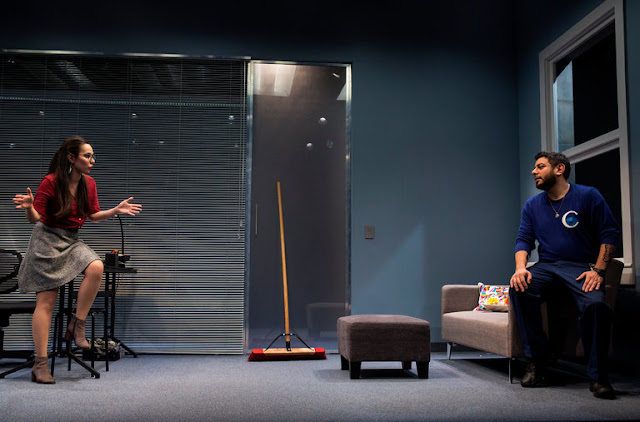Full Disclosure: I am
from Los Angeles and have friends – male, female, gay, straight, minority and
white – that work in Hollywood. You may want to discount anything I write after
this as coming from an insipid asshole – I am sure the playwright would.
Did you know that people in Los Angeles are vapid, sun
worshipers that are too stupid to carry on a conversation, yet devious enough to stab each other
in the back to get ahead? They only drive because that way they can be alone
with their stupidity and as they plot to climb the studio ladder on shoulders of their betters? That Hollywood is
both a neighborhood and a suburb (as is all of Los Angeles) and is made up of
only misogynist men and backstabbing co-workers (of both sexes)? Of course you
do, you watch New York Theater and it is a constant source of humor.
Well, if you want to watch an hour and half of ranting about
the evils of Los Angeles, coupled with complaints about appropriation and use
of stereotypes of Hispanics, then rush down to the Cherry Lane Theater and
watch Fade.
 |
| Annie Dow and Eddie Martinez in Fade @ The Cherry Lane Theater |
I get it. I get that Fade
is using the protagonist’s own stereotypes to comment on how we as a society
are blind to our assumptions while often vilifying the actions of others. The “mote
and the beam” set in Hollywood’s treatment of minorities. However, Spielbergian beating us about the
head and shoulders to drive these points home is a bit much. And, the author’s
visceral hatred of Los Angeles and the people in it are tiresome and
distracting.
Fade is
about a Mexican writer, Lucia, invited to work on a television show about a Latina
lead. Lucia was hired in order to give the show authenticity. Annie Dow does
fine work at Lucia. She seethes with righteous anger at the system, and tries
to befriend the only other Hispanic on the lot, a janitor named Abel
(wonderfully played by Eddie Martinez). Lucia’s original clumsy attempts to
bond with Abel, because he is the only Hispanic she sees, are handled deftly by both actors.
Lucia is frustrated because the (white, old, lazy) men in
the writer’s room don't respect her and treat her like the help. It sounds
particularly tone deaf as she explains how this is insulting to Abel, as he
cleans her office (get it – irony). Ultimately she gets a chance to write and introduce
to the show a three dimensional Hispanic man, and she goes to Able for help - because in her 24 years she has never met an actual person.
They bond over Abel’s troubled past which he makes her promise not to use.
In a plot point so predictable it is painful, she uses
Abel’s story for her own writing. She gets ahead in her job and moves up,
because Hollywood rewards cheats. She becomes a power-bitch herself, dresses in
pumps and power jumpsuits and loses the sweet girl from Mexico she thought she
was.
I don't know if it is an economy of writing style, or a
purposeful choice based on Lucia’s point of view or a habit from writing TV
shows, but the plot as given is a problem in Fade. The only time Abel tells Lucia
anything about himself, she immediately uses it in exactly the way she promised
not to. Since months have passed, we can assume other things were said, but we
don’t really see any of it. So when he gives his big reveal, you know she will
make it her own. It is a bit like those old who dunnit TV shows, where the
biggest guest start is the murderer.
Fade has
some great acting, but a lot of sloppy stereotyping. Fade is stereotypically
insulting against: Hispanics in general, Latina women in particular, white men
and the city of Los Angeles. I enjoyed parts of the show, but I cannot
recommend it. I kind of feel like this is an elaborate trick to see if someone
will call out the show for stereotyping, even though it was written by an excellent Latina writer.
Fade | Playwright:
Tanya Saracho | Director: Jerry Ruiz | Cast: Annie Dow, Eddie Martinez

No comments:
Post a Comment